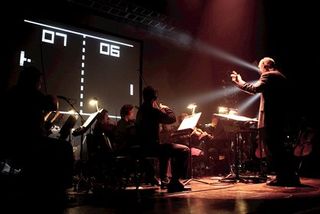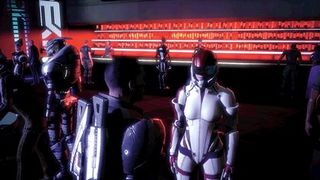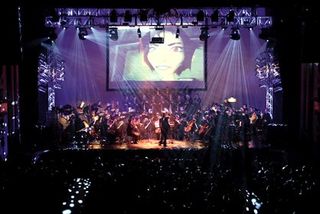Behind the scenes of gaming's great soundtracks
Getting the world to take game music seriously, one note at a time
When he started sharing his idea of an orchestra playing music from videogames, people thought the veteran composer Tommy Tallarico was off his rocker. It took him three years to convince publishers and developers that he was sane. “Imagine me making a call to Taito in Japan, asking them for the rights for the score of [1983 arcade hit] Elevator Action. “I’d like to play the theme tune to the game at the Hollywood Bowl with the Los Angeles Philharmonic. Hello... hello?’”
Naysayers were forced to eat their hats when Video Games Live (VGL) premiered in 2005 at the Bowl to around 11,000 punters. Since then, the show has toured worldwide, performing music from Final Fantasy, World of Warcraft, BioShock and Beyond Good and Evil, as well as venturing back to the days of Tetris, Space Invaders, and Pong. VGL even hit the US Billboard charts in August, 2008, with an album of string-tastic tunes.
Tallarico, readying himself for a show in Boston as we speak, is chuffed. Having grown up watching his cousin Steven Tyler, lead singer of Aerosmith, on stage, he always dreamt of producing a flashy show. And VGL is that realisation.

“What makes VGL unique is that everything is completely synchronised to video, rock ’n’ roll lighting, special effects, a stage show production, and interactive elements with the crowd,” he says. “I like to explain it as having all the power and emotion of a symphony orchestra and choir, the energy and excitement of a rock concert, mixed with the cutting-edge visuals, technology, interactivity and fun of videogames.”
The composer knows the score, having worked on over 275 titles since 1991 – Unreal Tournament, Lineage and the Test Drive series amongst them – and has seen game compositions transform from staccato bleeps into symphonic raptures. These days, many renowned movie composers work on game soundtracks: from Lord of the Rings composer Howard Shore, to Academy Award winner Bill Conti (who wrote the theme tune for Rocky, and went on to score The Godfather game), and Danny Elfman (who scored LEGO Batman).
While the pay package is alluring, games tend to put music to the fore, rather than hiding it behind dialogue. You might hear John Williams’ Indiana Jones score for a combined total of three hours over the course of a year; play World of Warcraft and you probably devour Jason Hayes’ work for 30+ hours a week.
“There’s definitely more freedom with games,” says Jason Graves, who wrote the soundtrack for Dead Space. “Part of it is the nurturing, creative aspects of games – also the amount of music that needs to be composed and implemented in such little time. Instead of being restrained to specific timings from a film, I stretch out and simply compose an idea, like combat or exploration, for several minutes at a time. The other biggest difference is the interactive aspect of game scores – an interactive score has more requirements than a traditional, linear film score.”
Sign up to the GamesRadar+ Newsletter
Weekly digests, tales from the communities you love, and more
Jack Wall, who wrote music for Splinter Cell and Mass Effect, and is Tallarico’s VGL cohort, keeps the story arc in mind when working, building melodies around a three-act structure. Genre plays a major role in composition – RPGs, for example, are more story-driven than RTSs – while third-party development tools allow composers to wrap their earholes around a game before putting treble clef to paper.

Above: Mass Effect
Graves spent two years working on Dead Space. For the adaptive music, he referred to visual walkthroughs and regularly visited the EA offices to play the game so he could score scenes by experiencing the creature encounters and pant-soiling shocks. Graves would compose music for a level and the audio director then fit it into the game to see how it interacted with the gameplay. When it came to recording, no expense was spared.
“There were two recording sessions for Dead Space. The first was in Seattle with the Northwest Sinfonia: about 65 players total. The second one was at Skywalker Sound with another 65-piece orchestra plus a 20-member choir.” A lot of people think of memorable game composition in console-y terms (Mario, Zelda, Castlevania, Sonic, etc.) but since the turn of the century, PC titles like Hitman, Warcraft and Half-Life have frequently scooped awards.
“I always try to write catchy melodies for my PC games,” says Jack Wall, who also composed for Myst. “PCs have less limitations than consoles – they often have multiple hard drives to stream off. In consoles you only have one stream and that can pose problems.” What about the increasing use of licensed music in games? Does that also pose problems, leaving the composer homeless? Wall reckons not, saying it comes down to what works best for a game. Ironically, some musicians say that composers remove them from the equation, due to the prevalent use of sampled scores.

“When it’s appropriate to score with a live orchestra, I’m going to do it every time,” says Wall. “I need as many tools in my bag as possible to get the best result. For example, 90% of Mass Effect’s music was electronic – I used those tools instead of bringing in a bunch of live players, which I usually do on most of my games. Using sampled scores isn’t about cutting anybody out, it’s about what’s right for that game.”

Oh, that's why the Stellar Blade devs were terrified by demo players: one fan's spent "about 60 hours" maxing Eve's skill tree before the action RPG is even out

A new Taylor Swift song mentions GTA, but some remember it mentioning Baldur's Gate 3, Final Fantasy 14, and more in hilarious Twitter trend
Most Popular




